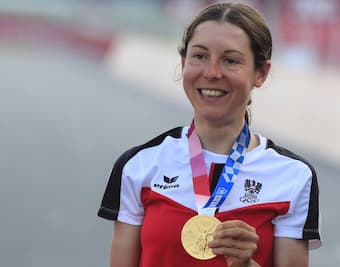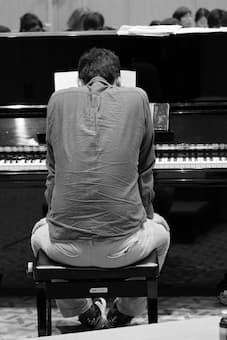
Anna Kiesenhofer
I’m not that interested in sport, but I did watch the Olympic cycling from Tokyo this year. I was surprised to discover that the Austrian cyclist Anna Kiesenhofer, who won the gold medal in the Tokyo Olympics women’s road race, is an amateur rider. She doesn’t belong to a professional team, which would pay her salary; in her non-cycling professional life, she holds a PhD in mathematics and is a researcher and lecturer at the Swiss Federal Institute of Technology.
She may be an amateur on paper, but watching her dominate the women’s road race, storming far ahead of the main field, it was evident that she is someone who takes her training and preparation very seriously, as seriously as any pro rider.
“….cycling takes up a lot of space in my life. I don’t earn money. For the last one-and-a-half years, I was completely focused on today.”
– Anna Kiesenhofer, in a post-race interview
There are several aspects of Anna Kiensenhofer’s attitude and training regime which I feel are particularly relevant, and also very inspiring, to musician – professional and amateur – and her dedication is proof that if one sets to a task with efficiency, commitment and self-determination it is possible to achieve greatness.
Of course we may not aspire to Olympian greatness, but many of us strive for self-improvement, personal fulfilment and excellence in our music making – at whatever level we play.
Like the sportsperson’s, the musician’s training can lay the foundations of efficient, intelligent practice habits, secure technique, confidence in performance, musicianship, artistry, and – importantly – independence. While many of us may rely on the advice and support of a teacher or mentor, there comes a point when we may choose to step away from a teacher, either temporarily or permanently, and pursue our musical studies independently. It takes a leap of faith to set oneself on a path of self-coaching, encompassing self-reliance, self-determination, and personal autonomy without the support of a teacher, but this is, I believe, necessary for one’s development as a musician seeking excellence and mastery.
Richard Wagner: Die Walküre, Act III: Ride of the Valkyries (Leningrad Philharmonic Orchestra; Yevgeny Mravinsky, cond.)
Anna Kiesenhofer’s principles of self-coaching:

© Kazuo ota / Unsplash
Don’t trust authority too much/Don’t necessarily believe your coach/teacher
By her own admission Anna Kiesenhofer is “anti-authoritarian” when it comes to coaches/trainers, especially the ones who claim to have all the answers and who seek to impose their own ways of doing things on their students.
“I started to realise that all those people who say they know, they actually don’t know. Many of them don’t know, and especially those who say that they know, don’t know, because those who do know say that they don’t know.”
A good teacher is not authoritarian; be wary of those who claim to have all the answers. A good teacher is open to discussion, adjustment, reflection to find what is best for the individual student, rather than a “one size fits all” approach. Don’t expect a teacher to have all the answers – and the best teachers know that they don’t have all the answers! A good teacher will equip their students with the skills with which to become an independent, self-reliant learner, and also a self-coach.
Find out what works for you personally
I meet people in the amateur piano world who’ve had lessons with a wide variety of teachers and attended many piano courses, hoping for the big answer, the miracle, which tells them “how to do it”. Instead, they are overwhelmed or confused with such a wealth of advice (much of it expert or well-meaning) and lack the confidence to extract from that advice what will actually be useful to them.
Exercise a degree of healthy scepticism when taking advice from others, even the most highly respected teachers. Be open to suggestions, but also questioning and curious, and select what advice works for you to support your own musical development.
Be wary of overly dogmatic or controlling teachers whose approach is “it’s my way or the high way”. Such a blinkered attitude will not serve your progress.
Create your own training (practicing) plan
Someone else’s practicing regime may not be the right one for you. Again, the “one size fits all” approach is impractical because we are all different, and while one person may do the bulk of their practicing first thing in the morning, others may prefer to break up the practice sessions into smaller sessions throughout the day. Create your own practicing regime and stick to it, but be willing to make adjustments to suit your changing needs, progress and goals.
And talking of goals…..Set yourself clear and achievable goals – a series of smaller targets is easier to manage than one big one and also helps to keep you motivated without feeling overwhelmed by the enormity of the task ahead.
It may be helpful to discuss practice habits with others and to observe what others are doing, but be wary of comparing yourself to others as this can lead to issues with confidence or self-esteem. Have the confidence to stick to your own plan.
J.S. Bach: Trio Sonata No. 4 in E Minor, BWV 528: II. Adagio (arr. A. Stradal for piano) (Víkingur Ólafsson, piano)
There are no short cuts, no miracles
“If it was easy, everyone would do it” was a favourite line from one of my teachers, and he’s right. Learning a musical instrument is difficult, at whatever level one plays, and appreciating and accepting this is an important part of the self-coaching mindset.
There are no miracles: self-determination, commitment, grit and, above all, a willingness to submit to the ongoing process of learning with persistence and passion are the qualities which drive achievement, whether you are a musician or an Olympic athlete.
For more of the best in classical music, sign up to our E-Newsletter


